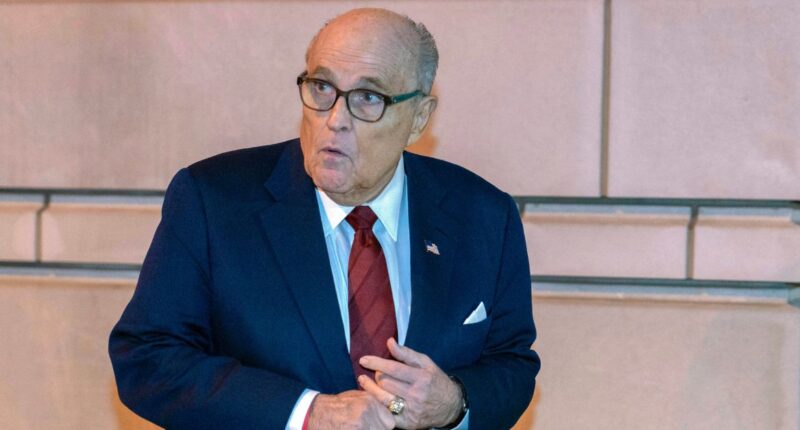
Former Mayor of New York Rudy Giuliani leaves the federal courthouse in Washington, Monday, Dec. 11, 2023 (AP Photo/Jose Luis Magana).
Rudy Giuliani is facing potential contempt charges from a federal judge in New York for failing to disclose court-ordered information requested by two Georgia election workers he defamed. The workers are seeking to collect on a $148 million judgment against Giuliani.
U.S. District Judge Lewis J. Liman denied Giuliani’s request for an order of protection that would have allowed him to continue withholding the information requested by Ruby Freeman and her daughter Shaye Moss. The information is related to the defamation judgment and Giuliani’s actions during pretrial discovery.
In a concise four-page order, Judge Liman pointed out Giuliani’s repeated missed deadlines and disregard for court orders pertaining to the specific information sought by the election workers. Liman also hinted at an upcoming decision on the plaintiffs’ requests to hold Giuliani in contempt for his actions.
“The law imposes consequences on parties who disregard their obligations,” Liman wrote.
The order stems from litigation regarding the fate of Giuliani’s multimillion-dollar Florida condominium, which earlier this year he claimed was his permanent residence, making it eligible for homestead protection under state law and thereby exempting the Palm Beach property from debt collection proceedings.
Attorneys for the Georgia election workers have pushed back on that claim, alleging in court documents that Giuliani treated the Florida condo as a vacation home, not a permanent residence. The duo have been alleging that Giuliani is refusing to answer certain questions required in the discovery process because truthful answers would show he has not been honest about the Florida property.
The issue of Giuliani’s permanent residence will be central to the Jan. 16, 2025, trial between the parties.
As part of the litigation, Freeman and Moss in November asked Giuliani to identify any financial, medical, or legal professionals he had consulted with for the last four years as well as any email/messaging accounts and phone numbers used in that time period.
After he missed several court-ordered deadlines, Giuliani eventually objected to the questions, claiming that the information was protected by “privilege, including, but not limited to the attorney-client privilege and/or work product doctrine and doctor patient privilege.” He also objected to providing the plaintiffs with his phones and messaging accounts, claiming such information “poses a safety and security concern to his wellbeing, as there were previous threats received by Defendant.”
Liman, on Dec. 17, penned a scathing rebuke of Giuliani’s late objections and issued an order compelling him to provide answers to Freeman and Moss.
“Defendant’s responses can only be understood as showing disrespect for the law and disregard for his obligations under law,” Liman wrote in the order, referring to Giuliani twice missing deadlines to respond to the plaintiffs’ questions. “The Defendant has not shown good cause for his failure to timely respond, and his tardy objections are accordingly waived.”
But even if the objections had not been waived, Liman on Dec. 17, said that Giuliani’s objections were “without merit” as the information being sought was “squarely relevant to Defendant’s claim for a homestead exemption.”
Instead of responding to the court’s order to compel, Giuliani last week submitted a request for an order of protection that did “not present any arguments he did not have the ability to present in his opposition to Plaintiffs’ motion to compel.” Rather, the judge said Giuliani’s latest request simply interpreted plaintiffs’ request in the most absurd manner possible and then argued the information requested was irrelevant.
“The Court previously addressed why both interrogatories call for highly relevant information. Defendant does not identify any information the Court overlooked,” Liman wrote. “Local Civil Rule 26.4 requires that ‘[d]iscovery requests must be read reasonably.’ The rule does not permit a party to conjure an extreme interpretation of an interrogatory and then to argue that from that extreme interpretation, no response whatsoever is required.”
“The Court’s order of December 17, 2024, required Defendant to answer the interrogatories by December 20, 2024, or show cause why he should not be held in contempt with contempt sanctions imposed,” the order states. “The record is now closed on the order to show cause why Defendant should not be held in contempt. The Court will be prepared to announce its decision on the contempt request as early as the hearing on January 3, 2025.”
Liman also noted that the parties should be prepared to address whether, in addition to being held in contempt, Giuliani should also be sanctioned for his conduct.








